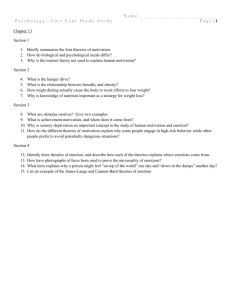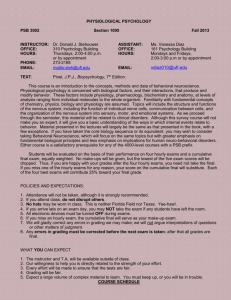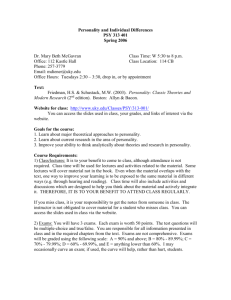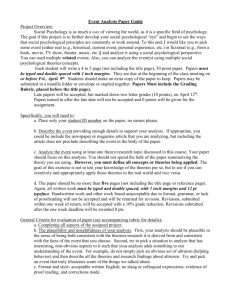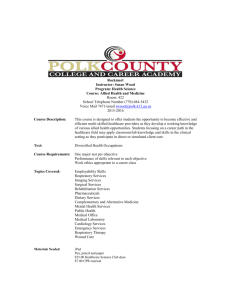Course: PSYC 346 P
advertisement
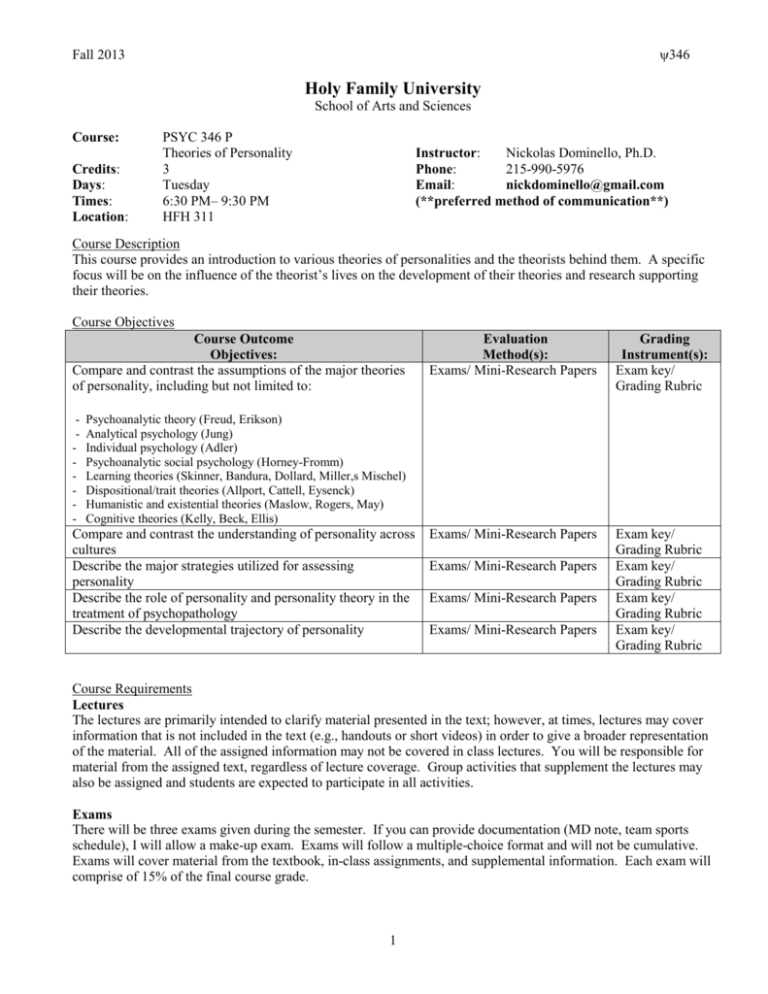
346 Fall 2013 Holy Family University School of Arts and Sciences Course: Credits: Days: Times: Location: PSYC 346 P Theories of Personality 3 Tuesday 6:30 PM– 9:30 PM HFH 311 Instructor: Nickolas Dominello, Ph.D. Phone: 215-990-5976 Email: nickdominello@gmail.com (**preferred method of communication**) Course Description This course provides an introduction to various theories of personalities and the theorists behind them. A specific focus will be on the influence of the theorist’s lives on the development of their theories and research supporting their theories. Course Objectives Course Outcome Objectives: Compare and contrast the assumptions of the major theories of personality, including but not limited to: - Evaluation Method(s): Exams/ Mini-Research Papers Grading Instrument(s): Exam key/ Grading Rubric Exams/ Mini-Research Papers Exam key/ Grading Rubric Exam key/ Grading Rubric Exam key/ Grading Rubric Exam key/ Grading Rubric Psychoanalytic theory (Freud, Erikson) Analytical psychology (Jung) Individual psychology (Adler) Psychoanalytic social psychology (Horney-Fromm) Learning theories (Skinner, Bandura, Dollard, Miller,s Mischel) Dispositional/trait theories (Allport, Cattell, Eysenck) Humanistic and existential theories (Maslow, Rogers, May) Cognitive theories (Kelly, Beck, Ellis) Compare and contrast the understanding of personality across cultures Describe the major strategies utilized for assessing personality Describe the role of personality and personality theory in the treatment of psychopathology Describe the developmental trajectory of personality Exams/ Mini-Research Papers Exams/ Mini-Research Papers Exams/ Mini-Research Papers Course Requirements Lectures The lectures are primarily intended to clarify material presented in the text; however, at times, lectures may cover information that is not included in the text (e.g., handouts or short videos) in order to give a broader representation of the material. All of the assigned information may not be covered in class lectures. You will be responsible for material from the assigned text, regardless of lecture coverage. Group activities that supplement the lectures may also be assigned and students are expected to participate in all activities. Exams There will be three exams given during the semester. If you can provide documentation (MD note, team sports schedule), I will allow a make-up exam. Exams will follow a multiple-choice format and will not be cumulative. Exams will cover material from the textbook, in-class assignments, and supplemental information. Each exam will comprise of 15% of the final course grade. 1 346 Fall 2013 Mini-Research Papers Three brief research papers will be assigned throughout the semester. The topic for each assignment will vary and will be posted in the Assignment folder of the Course Content section on PsycDom at least two weeks prior to the assignment due date. Research papers should be 3-5 pages in length (APA format) and sufficiently address the selected writing prompt. Collectively, reaction papers will account for 25% of your final course grade. Final Paper & Presentation Toward the end of the semester, you will explore and evaluate a personality theory of your choosing. Your theoretical analysis will be supported in a 5-page written paper and be offered to the class in a 5-to-7 minute presentation/activity. Details for the assignment are posted in the Assignment folder of the Course Content section on PsycDom. The assignment will account for 20% of your final grade. Required Textbook Feist, J., Feist, G.J., & Roberts, T.A. (2012). Theories of personality (8th ed.). New York, NY: McGraw Hill. Grading Policy Grading will be consistent with the Holy Family grading system: Letter Grade A B+ B C+ C D+ D F Final course grade is based on: 15% Exam 1 15% Exam 2 Per Credit 4.0 3.5 3.0 2.5 2.0 1.5 1.0 0 Equivalent 94 – 100 90 to 93 86 to 89 81-85 77-80 73-76 70-72 69 and below 15% 25% Exam 3 Reaction Papers Mastery of Subject Outstanding Superior Above average Average Satisfactory Deficient Not Acceptable Failure 20% 10% Final Paper/ Presentation Attendance/ Participation Academic Integrity Policy The University’s policy on academic honesty is available for review in the current Undergraduate Catalog and Graduate Catalog. Both of these documents are available in print (School Office) and on the University’s website: http://www.holyfamily.edu. Violations of the University’s standards in any form (including but not limited to plagiarism) as described therein or otherwise identified will not be tolerated. Proven incidents of academic dishonesty are subject to progressive sanctions. Responsibility for knowing and understanding the University’s position and policies on academic integrity rests with each student. Disability Disclosure Statement Any student who has a need for an accommodation based on the impact of a physical, psychiatric, psychological, and/or learning disability must contact the Disability Services Office at 215-637-7700 (ext. 3231), located at the Northeast Philadelphia Campus in room 222 of the Campus Center. Please contact this office as soon as possible, as eligibility determination requires submission of documentation by the student and review by the Disability Eligibility Committee prior to any accommodation authorization. Accommodations for individual students cannot be provided by the instructor without letters of authorization from the Disability Services Offices. I recommend also contacting me privately to discuss the specific situation as soon as possible. Class Attendance and Participation Policy The University attendance policy outlined in the Undergraduate Catalog (2013-2014) states “Students are expected to attend all classes and laboratory sessions regularly and may not absent themselves except for illness or some 2 346 Fall 2013 other serious matter. In any semester absences equal to twice the number of weekly contact hours of a given class are deemed excessive. Final grades and/or receipt of academic credit may be jeopardized by excessive absences” (p. 54). Read the text, ask questions, give comments, and participate during lecture! This will ensure that you enjoy the course and learn the material. And, this will boost your grade. I will take attendance each class period. Attendance will be taken at the start of each class. If you are excessively late you will be counted as absent for that class. I understand that missing a class is sometimes unavoidable; therefore, you will be permitted to miss one class without penalty. If you miss a class, it will be your responsibility to get the notes from another student. I will be happy to answer any questions once you have made the attempt to find out what you have missed. Combined with participation, attendance will count for 10% of your final grade. PsycDom.com We have a course website, which can be accessed at PsycDom.com. A copy of this syllabus is available on the site under Course Content in case you misplace your copy. In addition, lecture slides, handouts, rubrics, and other course related materials used in class are posted on the site. Using the notes provided on PsycDom is optional; however, having the notes/outlines often allows students to concentrate more on the material being discussed as opposed to attempting to copy down all information covered in a given class period. If you elect to use the lecture outlines provided, you are responsible for downloading them and printing a “hard” copy in time for class. I will conduct lecture assuming that everyone has done so. If you do elect to print out the lecture notes, please print multiple slides per page; I will demonstrate how to do this during our first meeting. Please DO NOT ask me to provide answers if you have missed class. If you have missed class, utilize the handouts provided on PsycDom as worksheets and fill in the omitted information using your textbook. There will also be various announcements posted on the site, so please make a habit of checking the site a few times each week. You will be responsible for any information posted in announcements (e.g., changes to the syllabus, class cancellations). The web site will also have a course Calendar section, highlighting information about exam and assignment due dates. To access to the PsycDom site for this course: 1. go to www.PsycDom.com 2. select the Theories of Personality link on the left-hand side of the website home page Discussion Board - There is an Ask Your Instructor discussion thread on PsycDom. The purpose of this thread is to provide guidance and clarification for learners as we advance through the semester. If you have a question related to the course or assignments, please post your question in the discussion forum. Having a central location to “air” questions will allow multiple students to benefit from feedback provided by the course facilitator. Other Policies 1. Exam Policy I reserve the right to inspect any item that you bring with you into the classroom during an exam; this includes, but is not limited to, notebooks, papers, electronic devices, food or drink items, and clothing. Please consider carefully what you choose to bring to an exam. Please use the lavatory prior to the start of the exam period. If you arrive late to any test, you may take the test, provided no one has completed the test and left the room. If someone has completed the test and left the room prior to your arrival, you will not be able to take the test. 2. Make-up Exams In fairness to all concerned, exams should be taken by everyone at the same time. If missing an exam is unavoidable, you must let me know without delay, and if at all possible, in advance of the scheduled exam. 3 346 Fall 2013 Some form of written documentation will be necessary in order to schedule a make up exam (e.g., MD note). If you miss a scheduled exam (without acceptable documentation) then your grade will be based on the exams you have completed. In the event that University is closed and classes are cancelled or the on the day of an exam (or in the unlikely event that I cancel class), the exam will be held during the next scheduled class meeting. 3. Consideration and Respect If there is somewhere else that you would prefer to be during the designated class time, please be there (really!). Activities including but not limited to text messaging, socializing, doing work for other courses, checking email, surfing the web, sleeping, talking on the phone or instant messaging are disrespectful to me and to the rest of the class. Please refrain from engaging in such activities during scheduled class times. If it is necessary for you to arrive to class late or leave class early please do so quietly. Habitual tardiness is a form of disruptiveness and will affect class participation grades. Disruptiveness will not be tolerated. Please show consideration for your fellow classmates and TURN OFF CELL PHONES (or SILENCE cell phone ringers/alerts) during the scheduled class meeting times. Students are expected to treat everyone with respect. Racist, sexist, or otherwise offensive language and/or comments will not be tolerated. 4. Email and PsycDom This course focuses heavily on information literacy. A central aspect of information literacy is familiarity with and ability to communicate via email. Every student is expected to have an active email account and is responsible for checking email at least once a week. As previously mentioned, we have a website for the course on PsycDom. Please make a habit of checking the site at least two times each week for announcements, assignment information, course content updates, changes to the syllabus, etc. The abovementioned discussion forum is also located on PsycDom. 4 346 Fall 2013 COURSE SCHEDULE* September 3 Course Introduction - September 10 No Class - September 17 Intro to Personality Chapter 1 September 24 Freud: Psychoanalysis Chapter 2 October 1 Adler: Individual Psychology Jung: Analytical Psychology Chapter 3 Chapter 4 October 8 Exam 1 Research Paper #1 Due October15 Klein: Object Relations Theory Horney: Psychoanalytic Social Theory Chapter 5 Chapter 6 October 22 Fromm: Humanistic Psychoanalysis Sullivan: Interpersonal Theory Chapter 7 Chapter 8 October 29 Erikson: Post-Freudian Theory Chapter 9 November 5 Exam 2 Chapters 5-9 November 12 Maslow: Holistic-Dynamic Theory Rogers: Person-Centered Theory May: Existential Psychology Reserach Paper #2 Due Chapter 10 Chapter 11 Chapter 12 November 19 Allport: Psychology of the Individual Chapter 13 Eysenck, McCrae, & Costa’s Trait/ Factor Theories Chapter 14 November 26 Skinner: Behavioral Analysis Bandura: Social Cognitive Theory Rotter and Mischel: Cognitive Social Learning Kelly: Psychology of Personal Constructs Final Presentations I December 3 Final Presentations II Final Paper Due Research Paper #3 Due December 10 Exam 3 Chapters 1-4 Chapter 15 Chapter 16 Chapter 17 Chapter 18 - Chapters 10-18 *This syllabus is subject to change at the discretion of the professor 5

